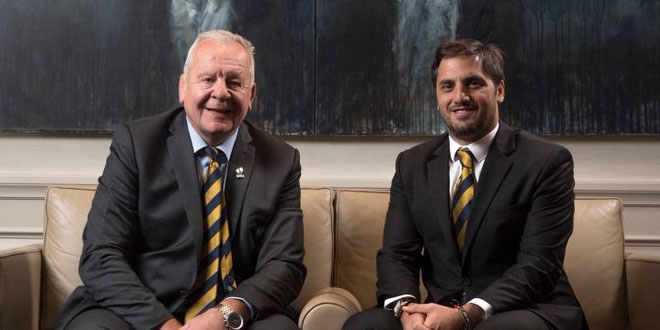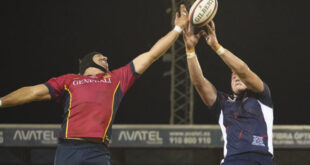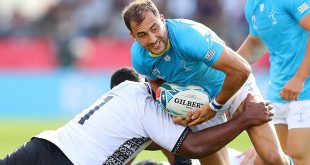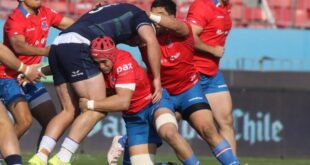On Sunday the electronic ballots will open with 51 votes to be cast by World Rugby Council members to decide on the position of Chairman. The incumbent is Bill Beaumont, his challenger current Vice-Chair Agustín Pichot. Representatives have until Thursday to make their decision. On May 12 one of them will be handed a four-year mandate to lead the world governing body through an unprecedented financial crisis and into the post-pandemic era.
Many clubs and unions have been riding precipitously close to the line of solvency and in some cases the bubble has already burst. USA Rugby have filed for Chapter 11 bankruptcy and the Scottish Rugby Union is to furlough most of their staff. Australia is a complete mess with their top executive Raelene Castle choosing to jump before she was pushed. The English Premiership is desperate to continue their currently suspended campaign, and indeed the French Top 14 have declared their intent to stage playoff games in August, immediately before what would be the start of the new season.
Of course there is no guarantee that those games will take place. The July tests are certainly a write-off and there are growing concerns no international rugby will be played at all for the remainder of the calendar year. Amidst the panic, the most engaging and potentially significant board room confrontation in World Rugby’s history is to be adjudicated. The two candidates are depicted as prototypical.
Beaumont, the old Lion. Hewn from the days of yore when real men wore collared shirts and short shorts to battle. A stoic elder statesman who is charged with being too English and detached from the demands of modern sport.
Pichot, the prowling Puma. Beaumont’s junior by 23 years. A product of the professional era. Aggressive, intelligent, calculating. Accused of being a self-serving populist whose ideas are too radical for a sport so entwined by its own mythology that innovation is often viewed as an assailant rather than an ally.
In terms of policy there are similarities between the two. The most contentious platform piece is the so-called Nations Championship, also referred to as the World League. Pichot was the early driver but Beaumont has latched on and both remain keen to revisit the concept despite its inherent flaws and the initial offering being rejected last year. On this there seems little to choose though Pichot maintains that he is open to negotiation in this regard, citing Beaumont’s failure to consult with the players association prior its poorly orchestrated public rollout.
If this is a wash, so too are their stances on support for women’s development and immediate pandemic recovery. Neither have offered anything noteworthy on the former with both agreeing more needs to be done, while World Rugby have already announced a $100 million USD relief fund though how the stimulus will be distributed remains vague. Both are in favor of the elusive ‘global calendar’, so on that as well we can consider them level.
One of Pichot’s signature accomplishments in his time as Vice-Chair has been the change to international eligibility. Regulation 8 will change in January of next year to require five consecutive years of residency to qualify for an adopted nation, up from three. On this Pichot says he will stay for the time being, while Beaumont has been appealing to the Pacific Island nations by flirting with a change that could see former All Blacks, for example, eligible for Samoa after a stand-down period.
Such an alteration is unlikely to be supported by most Tier 2/3 nations as it would have little to no impact on many beyond the Islands, and even then it would be Samoa and Tonga far more than Fiji who would benefit. It’s worth noting that Hale T-Pole, the Chair of Pacific Rugby Players, is himself advocating for looser restrictions on Island players in Super Rugby and is no longer concerned about Regulation 8.
“You could also work out criteria to boost the Pacific Islands. Charles Piutau could return to play for Tonga after a four-year stand-down. Semesa Rokoduguni, the Tuilagis, the Vunipolas who could all qualify for the likes of Fiji, Samoa, Tonga. When they’re coming to the end of their years they might fancy one last hurrah with those countries.”
Those were Beaumont’s words in conversation with The Daily Mail. Not only is the tone condescending, the statement reveals that he does not actually understand the regulations as they stand. Had World Rugby moved to reschedule the Oceania Olympic qualifiers for Tokyo 2020 to earlier last year instead of November, Piutau and others could have used the sevens ‘loophole’ to change allegiance in time for the World Cup last fall.
Beaumont’s mantra of ‘evolution, not revolution‘ is again evident in his avoidance of the topic of electoral reform on the World Rugby Council. His rival has stated unequivocally that he supports changing the current voting structure that currently grants Tier 1 nations three votes while seven ‘lesser’ partners get only one. Japan is the exception being granted two, the same afforded to the six regional associations.
A clear separation between the two is evident in one of Pichot’s campaign promises – to deliver an improved rugby video game. People who scoff at this suggestion fail to comprehend the affect that franchises such as Madden, FIFA, and NBA 2k have had on capturing new and younger audiences. Those who are more inclined to the virtual world recognize that no measurable progress has made on this front in rugby since 2006. Many would argue 1997’s Jonah Lomu Rugby is the best video game the sport has churned out. On this Beaumont seems to have no interest.
“If you sit on your backside all day playing PlayStation… you will probably end up getting obese and dying of diabetes.”
Properly in context, those remarks to the Daily Telegraph were used to illustrate that many pursuits involved an element of risk, and it should be accepted that some physical risk must always be expected in rugby. It may not have been intentional but the words also expose Beaumont’s underlying disregard for the gaming world. They would certainly never come from Pichot, who is nicknamed ‘Ficha’ for his habit of sticking quarters in arcade games during his youth.
In regards to safety Beaumont can claim a victory. He has presided over tackle law reform and the sport has made undeniable progress in concussion management. On this Pichot agrees and does not deny his opponent credit. Beaumont continues to ponder changes to the game itself, openly concerned that the game at the highest level is no longer for ‘all shapes and sizes.’ The influence of diminutive World Cup winners Faf de Klerk and Cheslin Kolbe however suggests that opportunities remain for those on the smaller end of the scale.
Another success for Beaumont over the past four years include the expansion of the Women’s Sevens Series to eight stops though its implementation has left a lot to be desired. The numbers of women on the World Rugby Council has also increased. At the moment, however, only one resides on the Executive Committee – recent ‘independent’ appointment Angela Ruggiero, an Olympic ice hockey gold medalist from the USA who was formerly on the International Olympic Committee.
Above all it’s important to note that whichever candidate wins will not wield unlimited power over the Council. Indeed fears that Pichot will somehow cause the collapse of the Six Nations are misplaced. World Rugby has no power to dictate to that tournament any more than it does The Rugby Championship. Whatever plans Beaumont or Pichot put forth must be ratified by a committee. The difference between the two will ultimately come down to ideas and the ability to convince others of their merit.
Campaigning and the understanding of media has been a clear victory for Pichot. He has dominated starving sports columns in the past two weeks while Beaumont has been scrambling to play catch-up. Their social media following tells you all that is needed as to whom is more in touch with online communication – at the time of writing Beaumont has just shy of 10k followers on Twitter while Pichot has nearly 15 times as many. If nothing else, Pichot offers himself as a prominent figurehead unlike any the sport has yet experienced.
Pichot would also be an historic departure from those that have resided over the Council to date. All are of the original Five Nations. The late Vernon Pugh of Wales was the first elected leader in 1996, remaining until his death in 2003. Syd Millar of Ireland followed until 2008, when he was succeeded by Bernard Lapasset of France. Beaumont’s tenure began in 2016. Should Pichot win, he would be the first Chairman from outside of Europe and the youngest by six years.
Those in favor of Pichot point to his track record as a clear sign he is a ‘man of action,’ not just rhetoric. He lobbied heavily for his beloved Pumas to be accepted into the Rugby Championship and Super Rugby, and negotiated more equitable terms for Argentine players to be released by French clubs for test windows. More recently Pichot backed Vancouver over Scotland to get a spot on the World Sevens Series, and was undeniably the dominant force behind the creation of the Americas Rugby Championship and the Americas Rugby Challenge (aka ARC ‘B’).
The Argentine insists that this is not a classic tale of North vs South, though similar party lines have been drawn in the sand since Pichot’s public declaration just two weeks ago. Of the heavyweights, the Six Nations are expected to side with their man Beaumont, in tandem with his Vice-Chair to be Bernard Laporte of France. SANZAAR have backed Pichot, who is running solo with any eventual stable-mate to be decided post-election.
Also behind Pichot are Sudamérica Rugby, Uruguay, and today Asia Rugby have publicly thrown their support behind the challenger. Rugby Americas North are also expected to back him, and rumblings from the Colorado mountains are that USAR’s board has given their blessing to the man who recently sat in on meetings on behalf of World Rugby. If that is accurate it would leave Canada as potentially the only Americas nation still leaning towards Beaumont, though it’s understood that the board is not unanimous.
Traditionally Canada have enjoyed strong relations with the UK nations and a South American website recently claimed that Rugby Canada had informed Pichot they were ‘committed to the Commonwealth’, though that statement has since been deleted. Dr. Pat Parfrey is the voting member for Canada on the World Rugby Council and the former Ireland international has strong ties to the ‘old boys club’ as do Senior Men’s head coach Kingsley Jones and the influential Gareth Rees. It could very well be that in their estimation Beaumont is the preferable candidate.
While the votes cast are in secret, it’s inevitable that the particulars will find their way into circulation given the narrow margin of victory widely expected. Rugby Canada must weigh whether supporting their old connections is worth potentially alienating themselves from the rest of the Americas. Their future is undoubtedly tied to those on this side of the Atlantic, and given recent suggestions that there are potential cracks in the Six Nations foundation a pause for thought before the final vote may be in order.
Doubts began to creep in when it was revealed that Fiji’s Chairman and nominee for the World Rugby Executive Committee, Francis Kean, was convicted and jailed for manslaughter in 2007. It was Kean who France had seconded for the committee, an arrangement made by Laporte to secure Fiji’s vote for Beaumont. Pacific Rugby Players Welfare CEO Dan Leo submitted a strongly-worded letter condemning the nomination and with Kean suddenly dumped by the Fijian union and cut from the ExCo ticket, Fiji’s support is no longer a guarantee.
The latest media reports suggest that both Wales and Ireland are genuinely considering breaking from the pack and backing Pichot. Wales are the only Six Nations member who supported South Africa’s bid for RWC 2023, ultimately won by France, and the only Six Nations member who responded to Pichot’s initial emails confirming his candidacy. Meanwhile it was Laporte who masterminded the successful bid behind closed doors, a vote that saw Scotland reportedly backing France ahead of a very disappointed Ireland. Of the two, Wales are said to be the least convinced by Beaumont though even their ‘defection’ would be a stunning rebuke.
Adding further fuel to the feeling that the pendulum has swung for Pichot in recent days is a report from prominent Japan-based journalist Rich Freeman that suggests they may opt to split their two votes, having previously been considered likely allies for Beaumont. The defection of Ireland or Wales would be a death knell for the Englishman’s chances, but the late surge in itself may just be enough for Pichot to claim the 26 votes required to win.
It’s a dizzying game of cloak and dagger and whatever the outcome the signs are clear that the sport is restless and unsatisfied with its current trajectory. Will the choice be the ‘evolution’ touted by Beaumont, or ‘revolution’ promised by Pichot? With the sporting world placed on hold indefinitely one does feel that if ever there were an opportunity to change directions, that time is now.
FOR BEAUMONT
Certain (17) – England (3), France (3), Ireland (3), Italy (3), Rugby Europe (2), Scotland (3)
Probable (4) – Wales (3), Fiji (1)
FOR PICHOT
Certain (17) – Argentina (3), Australia (3), New Zealand (3), South Africa (3), Rugby Asia (2), Sudamérica Rugby (2), Uruguay (1)
Probable (4) – Rugby Americas North (2), Georgia (1), USA (1)
UNCERTAIN
Japan (2), Oceania Rugby (2), Rugby Africa (2), Canada (1), Romania (1), Samoa (1)
 Americas Rugby News Rugby news from across the Americas!
Americas Rugby News Rugby news from across the Americas!




